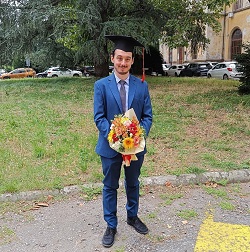Call for nominations: ERTS 2024 PhD Dissertation Award on embedded critical computing systems
The submission is now closed.
ERTS 2024 PHD AWARD SELECTION COMMITTEE
Members:
- Chris Johnsson, Queens University. Belfast, UK
- Jose Luis de la Vara, University of Castilla-La Mancha, Spain
- Amel Mammar, Telecom SudParis, France
ERTS 2024 PHD AWARD WINNER

PhD title: Analysis of Algorithmic and computational Aspects of Deterministic Network Calculus
Advisor : Giovanni Stea, Università di Pisa
Defense date: June 2023
Raffaele Zippo received his Ph.D. in Smart Computing from the University of Florence in 2023, and he currently works as a postdoctoral researcher at the Networking and Cloud Computing Lab within the University of Pisa. His research interests cover worst-case analysis of heterogeneous systems and algorithms for Deterministic Network Calculus computations. He is the primary author of Nancy, an open-source Deterministic Calculus library. He has been involved in industrial research projects, and is the coauthor of one patent.
Deterministic Network Calculus (DNC) is a well-known theory that uses (min, +) and (max, +) algebra to infer deterministic worst-case bounds on network delay and backlog. It represents traffic as a function of time and network elements (such as regulators, schedulers, and links) as operations that modify these functions. However, in nontrivial cases, computing DNC expressions is challenging without mature software support. Additionally, some types of DNC expressions are notoriously hard to compute, but research in the algorithmic aspects is hindered without a solid foundation based on extensible software.
In his thesis, Raffaele Zippo addressed this gap by developing Nancy, a computational library with rich support for DNC operations. Nancy is designed with an extensible, layered software architecture that implements the state-of-the-art DNC algorithms, specifically the framework of Ultimately Pseudo-Periodic functions. The library also employs software engineering techniques for efficient memory usage and parallelism on multicore systems. This architecture allows specialization of algorithms for performance improvements and enables new research on the algorithmic aspects of DNC.
Raffaele’s work includes practical use cases, novel algorithms, and optimizations that significantly improve computation times. He also highlights the functional and design differences between Nancy and the RTC Toolbox, emphasizing the stability benefits of using rational numerical types over floating point. As an open-source software, Nancy provides the research community with a solid foundation for future DNC studies, in both implementation and algorithmic exploration.
Accessit for:
1) Maialen Eceiza Olaizola, Mondragon Unibertsitatea, Spain
Advisor: Mikel Iturbe (Mondragon Unibertsitatea)
PhD Title: Novel Approaches for IoT and Embedded device fuzzing and its evaluation
2) Nikolena Christofi, LAAS-CNRS, France
Advisors: Claude Baron (LAAS-CNRS), Marc Pantel (IRIT), Xavier Pucel (ONERA)
PhD Title: Improving operational diagnosis with an interdisciplinary modelling approach
The award aims at recognizing an individual who has made throughout his or her PhD dissertation a significant contribution to the development and operation of safe, secure, real-time, autonomous and sustainable embedded critical computing systems. All topics related to the design, architecture, verification, validation or assessment of critical embedded systems and networks, including software and hardware layers, as well as engineering practices and tools are relevant.
The award recipient will receive a waived registration fee to attend the edition of the Embedded Real-Time Systems (ERTS) Congress at which the award is presented. The recipient will be required to attend ERTS to receive the award and will be invited to give a presentation to ERTS attendees.
Eligibility and Nomination
To be eligible for the award, the nominee’s PhD defense must be completed prior to the nomination deadline and must have occurred during the period [March 1st 2022- February 29th 2024].
Nominations are to be made by the nominee’s PhD advisor. The nominations package should include (in a single PDF file):
- A cover letter from the PhD advisor, including the name of the PhD granting institution, the date of the PhD defense and a brief nomination statement (1 page max).
- A two-page summary of the research work in English, including: 1) Problem description and significance, and 2) an argument supporting the innovative and the impact of the contributions.
- The curriculum vitae of the PhD recipient, including a list of publications that resulted from the dissertation research (including those that are under review at the time of nomination).
- Copies of up to three papers resulting from the dissertation work among the list above
- The reports of the PhD defense committee (rapporteurs' reports, and the minutes of the defense if applicable).
- The complete dissertation in its original language.
A special committee will evaluate all nominations made in the current edition and choose the award recipient. The committee Chair and the committee members will be appointed by the ERTS Scientific Committee chair after the nomination deadline to avoid potential conflicts of interest. The ERTS award committee shall not include members who have nominated someone for the award have contributed to the research carried out by a nominee. The committee chair and members will be published at the web site of the current ERTS edition.
Submission and Notification dates
Nominations for the award to be presented at the 2024 edition of ERTS should be mailed to the ERTS Chair : mohamed.kaaniche@laas.fr, no later than 11:59pm CET on March 15, 2024.
Make sure the words ERTS PhD Award are in the subject line. You will receive an acknowledgement of receipt (try again if you don’t). If you have difficulties with the size of the file including the nomination package, you may provide a URL link for retrieval in your email.
The winning work will be announced by End-April 2024.
ORGANISED BY

ERTS - IMPORTANT DATES
Abstract of Regular &
Short Paper submission (4 pages) : October 15th, 2023, November 26th, 2023
Acceptance Notification : February 8th, 2024
Call for nomination : ERTS 2024 PhD
Dissertation Award on Embedded critical computing Systems : March, 15th, 2024
Regular Paper for review (10 pages) : April 3rd, 2024
Final Paper (Short and Regular) : May 5th, 2024
Registration end of early bird rate : May 17th , 2024
Congress (new dates): June 11th to 12th, 2024
sponsors
partners









